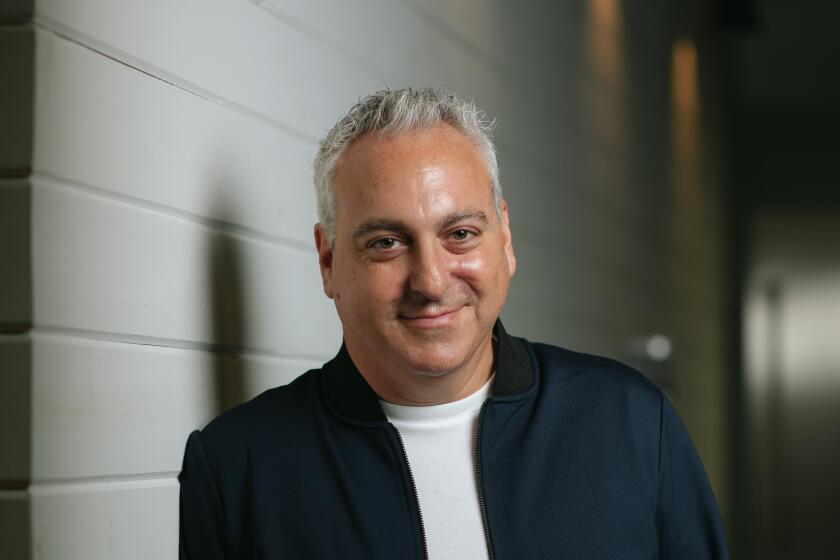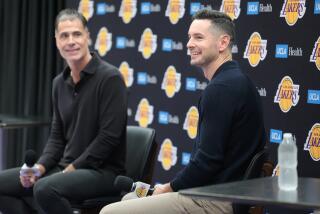How these producers are building a ‘Legacy’ with Lakers documentary and indie films
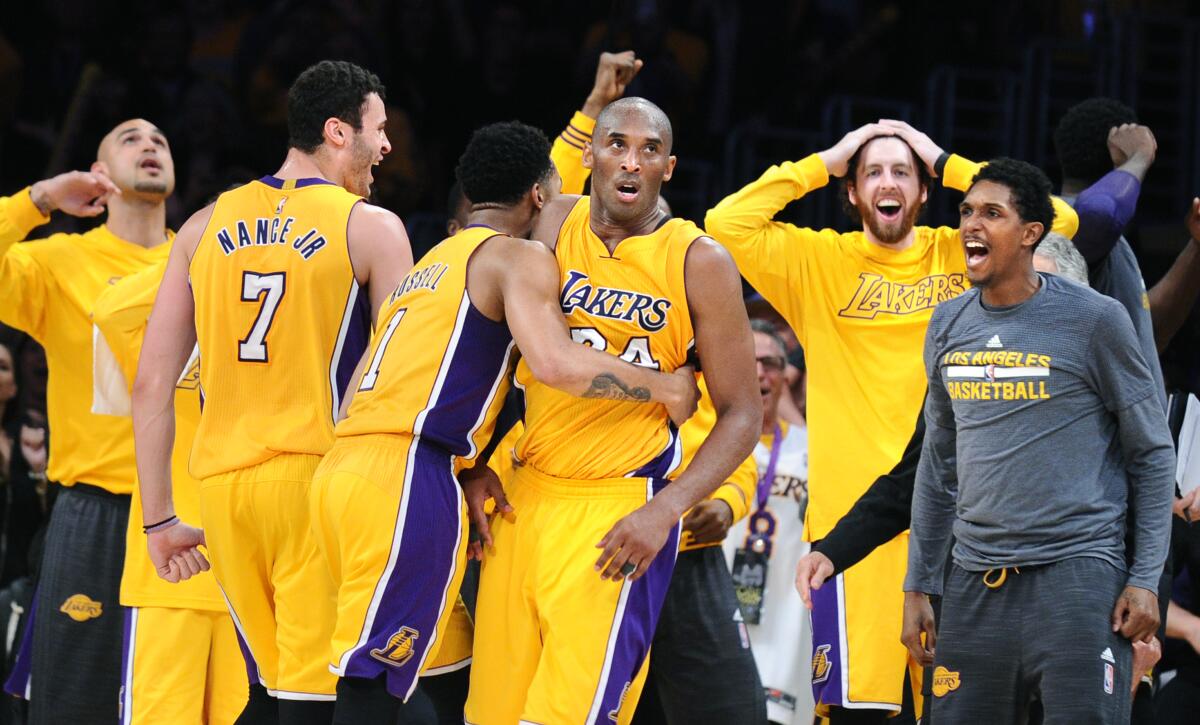
- Share via
Lacing together an in-depth look at the Lakers’ history took seven years, team owners’ participation, thousands of hours of video, NBA approvals — and producers willing to bankroll such an ambitious effort.
“Legacy: The True Story of the LA Lakers” is the highest-profile project undertaken by film production and financing firm Los Angeles Media Fund and its principals, Jeffrey Soros and Simon Horsman.
The project initially was envisioned as a 90-minute documentary about the team’s late owner Jerry Buss and Magic Johnson during the 1980s “Showtime” era. Lakers co-owner Jeanie Buss joined the film effort. But the turning point came three years later, in 2018, when Soros and Horsman signed on as producers and financiers, then turned to the accomplished Antoine Fuqua (“Training Day,” “What’s My Name: Mohammad Ali”) to direct the project.
Instead of focusing solely on “Showtime” Lakers, Fuqua wanted to traverse the past 40 years to delve into the Shaquille O’Neal and Kobe Bryant dynamic as well as the LeBron James years.
“We had to steel ourselves to finance a project with nine- or 10-episode ambitions,” Soros said in a recent interview.
Hulu, which debuted the series last month, releases new episodes on Mondays through Oct. 10.
For Soros and Horsman, “Legacy” gives their West Hollywood-based company a wider entry into two of the hottest spaces in media: documentaries and the intersection of celebrity culture and professional sports. The series offers “a vivid example of how we are straddling the world of entertainment and sports,” Soros said.
Horsman added: “Our DNA is producing feature films, although documentaries are increasingly becoming a core part of what we do.”
No longer an austere corner of the industry, streamers are paying bigger fees for documentaries, often about $1.5 million per an hour episode — up from $750,000 an hour just a few years ago. Viewers increasingly have been gravitating to the genre. In 2019, documentaries and docuseries accounted for 4.1% of demand for streaming original content in the U.S., according to research firm Parrot Analytics. In 2020, the first year of the pandemic, the audience share rose to 9%, Parrot Analytics said, with demand at about 10% this year.
Docuseries that give viewers behind-the-scenes peeks at celebrity culture, including sports, are in high demand. Programmers were encouraged by the success of ESPN’s “The Last Dance,” about Michael Jordan. It ranked in the top five docuseries in 2020, along with more broad-appeal series such as Netflix’s “Tiger King,” according to analytics firm Diesel Labs.
The producers and Hulu declined to disclose the cost of “Legacy,” which was built around archival footage and interviews — more than 100 interviews — with such Laker greats as James, Johnson, Jerry West, Kareem Abdul-Jabbar and James Worthy, as well as coaches Pat Riley and Phil Jackson.
Buss siblings Johnny and Jim (despite being at odds at times with sister Jeanie, an executive producer) and Janie Buss provided their own points of view about growing up in the business run by their larger-than-life father.
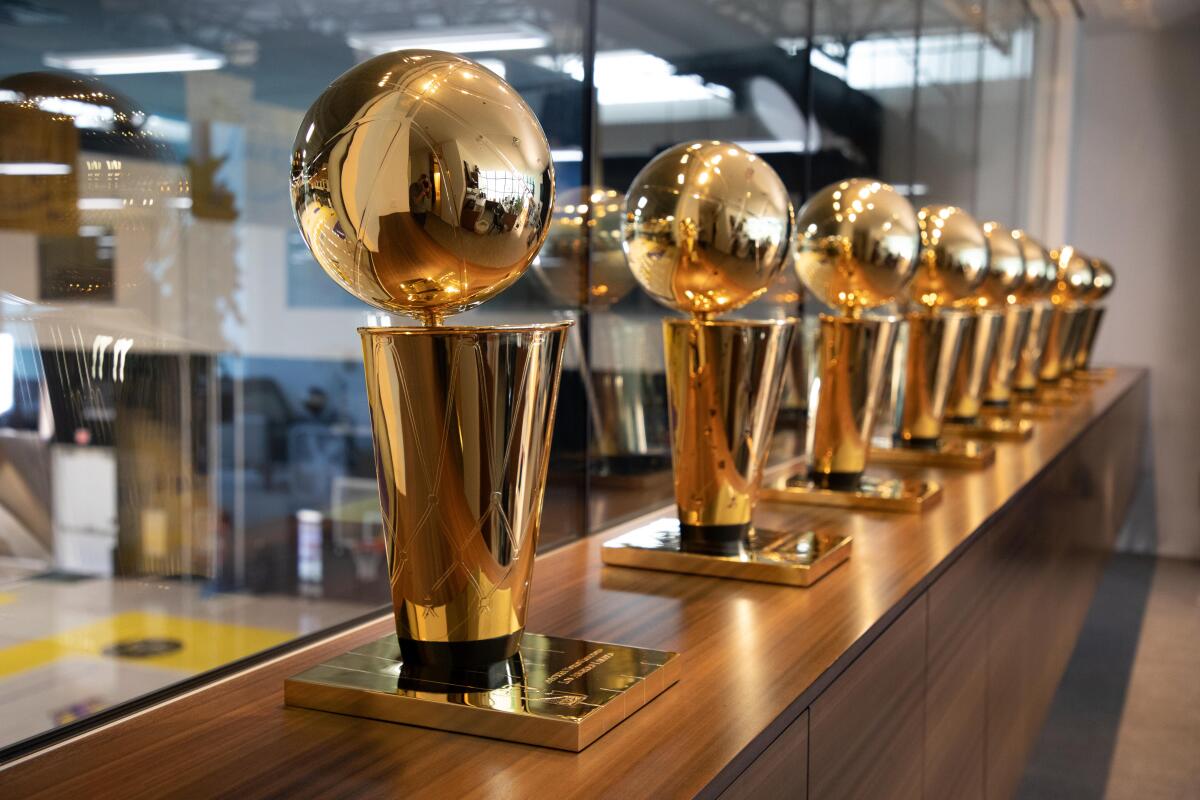
The Disney-owned streaming service declined to release viewership data but said it was pleased with the series’ strong performance.
The documentary is not just about sports, said Belisa Balaban, Hulu Originals’ head of unscripted and documentaries. “ ‘Legacy’ really is a family story: both the story of the Buss family and the family that is the wider Lakers family,” she said.
“Legacy” offers a counterbalance to HBO’s scripted “Winning Time: The Rise of the Lakers Dynasty,” which debuted earlier this year and was quickly blasted by some former Lakers. West demanded a retraction from HBO, calling his over-the-top portrayal “a character assassination.” HBO stood by the depiction, noting that it was not a documentary.
“There’s a reason ours is called ‘Legacy: The True Story of the Los Angeles Lakers,’” Horsman said.
Jeanie Buss gave filmmakers latitude, saying, “‘You can put in anything you want, as long as it’s true,’” Soros recalled. “That was important for us as filmmakers. We thought the audience would reject a puff piece.”
LAMF financed the project through its development (“We were millions of dollars into the production,” Horsman said) before Hulu acquired the series last year.
Shaping the project before bringing on the distributor enabled the filmmakers “to take our time with the story and figure it out without being under the pressure of a big partner that wanted to do things within a certain time limit,” said Kevin Mann, the lead executive producer who shepherded the project.
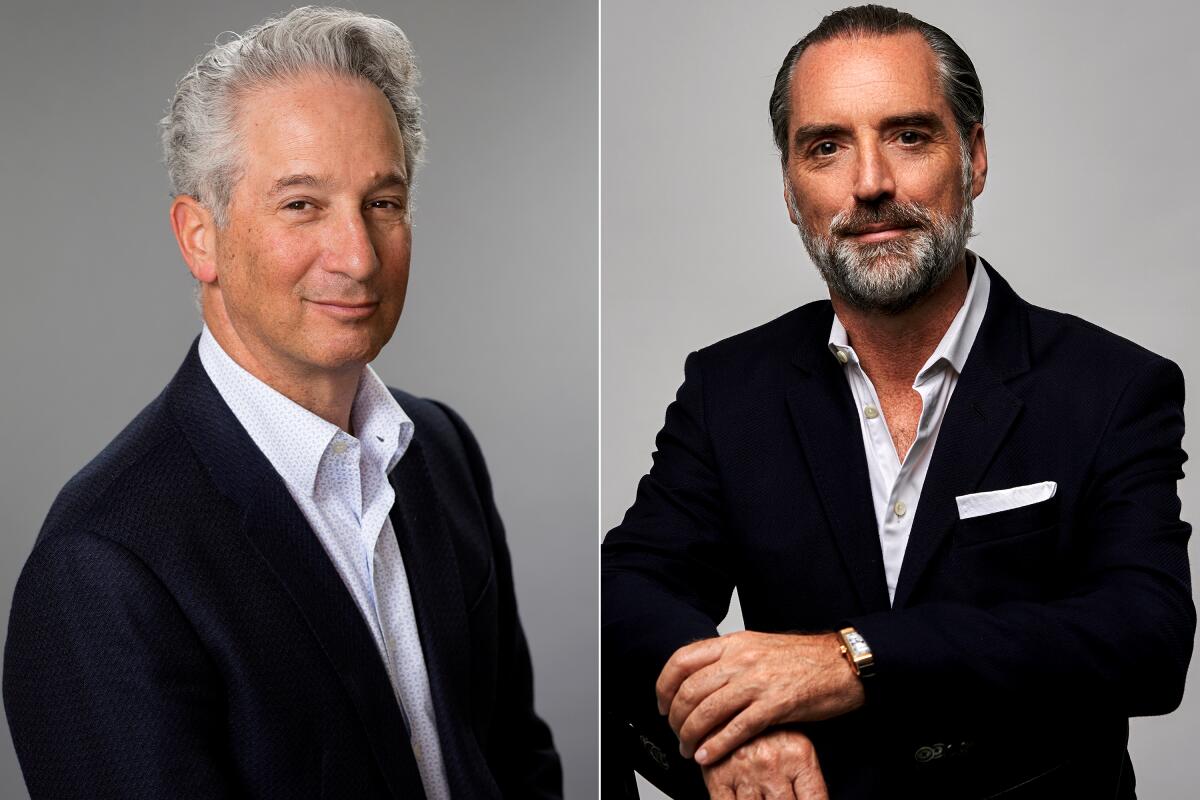
L.A. Media Fund formed eight years ago just as the industry began a shift to streaming.
“We quickly realized that the film industry was undergoing a serious transformation,” Soros said, adding the pair expanded their scope to develop material in-house rather than primarily investing in other producers’ projects.
The pair said they have invested more than $50 million in various projects and assembled an eclectic portfolio that includes a sports management company, LAMF Sports Management, which represents dozens of pro athletes, primarily NBA and NFL players. They are co-producers of the Tony Award-winning revival of “Oklahoma,” which is playing at the Ahmanson Theatre through Oct. 16. LAMF also co-financed this summer’s roller skating party “DiscOasis” at the famed Wollman Rink in New York’s Central Park.
Soros, nephew of billionaire George Soros, has spent his career in entertainment, starting out as an actor, bartender and a script reader before working for independent production companies, including Lightyear Entertainment, which made Jane Fonda workout videotapes. He segued to the role of producer/financier more than a decade ago.
He opened Considered Entertainment in 2008 and helped produce the Emmy-nominated 2010 documentary “A Small Act,” which tells the story of a boy from Kenya who pays tribute to a stranger from Sweden, a teacher, who paid for his education.
In 2014, Soros formed his current company with Horsman, a British lawyer who has a background in mergers, an internet startup and technology firms, before he turned to film. Horsman had served as legal counsel to Soros on a couple of his early films.
L.A. Media Fund’s name “is something of a play on the family business,” Soros said, a reference to his famous family’s financial fund empire.
But the name also hints at a rebellious subtext — “L.A.M.F.” was a graffiti-inspired title of a studio album produced by one of his favorite 1970s New York punk bands: Johnny Thunders and the Heartbreakers. “We’ve repurposed it,” Soros said.
Soros’ late father made his fortune in the shipping business. Paul Soros was an Olympic athlete from his native Hungary, a Holocaust survivor and philanthropist. Jeffrey Soros also serves as president of his parents’ nonprofit, the Paul & Daisy Soros Fellowships for New Americans, which gives away millions of dollars each year to help finance graduate educations for 30 young immigrants and children of immigrants. He also serves on the board of L.A.’s Museum of Contemporary Art as president emeritus.
The firm started in feature films and documentaries. It produced the 2017 sci-fi romance “The Space Between Us”; the 2018 HBO documentary “United Skates,” about Black roller rink culture; and the 2020 documentary “Ronaldinho: The Happiest Man in the World,” a portrait of the Brazilian soccer star, which was acquired by FIFA.
The firm had three films in the 2020 Sundance Film Festival, Josephine Decker’s “Shirley,” a biographical drama about horror writer Shirley Jackson, starring Elisabeth Moss; Carlos López Estrada’s “Summertime,” featuring a day in the life of young poets in L.A.; and “Some Kind of Heaven” from Lance Oppenheim, a documentary about life in a Central Florida retirement community.
They’ve been working on several new projects, including a comedy, “Cora Bora”; “Magazine Dreams,” starring Jonathan Majors, a breakout star from HBO’s “Lovecraft Country”; and the documentary “The Color of Cola,” about the hiring of an African American marketing team to promote Pepsi in the 1940s South.
One of their new big bets is “Rob Peace,” a biography of a young man from Newark who struggles at Yale University. Paramount Global agreed to distribute the film, which is set to go into production in November. It will be directed by Chiwetel Ejiofor and co-produced by Fuqua.
Andrew Fried, who founded Boardwalk Pictures in 2010, brought ‘Chef’s Table’ and ‘Last Chance U’ to Netflix. The company’s latest, ‘We Need to Talk About Cosby,’ is on Showtime.
In television, LAMF production units produced the initial season of Bravo’s “Real Housewives of Salt Lake City,” and the first season of Jada Pinkett Smith’s talk show, “Red Table Talk.” They are developing a scripted series directed by Jodie Foster, about the 1911 heist of the Mona Lisa painting from Paris’ Louvre Museum.
Soros and Horsman say they are poised to ride the content wave. Last year, they raised $253 million for a publicly listed special-purpose acquisition company, LAMF Global Ventures Corp. I, which could acquire other assets.
“Our trajectory is very much on a positive upswing,” Horsman said, “and we are making good money.”
More to Read
Inside the business of entertainment
The Wide Shot brings you news, analysis and insights on everything from streaming wars to production — and what it all means for the future.
You may occasionally receive promotional content from the Los Angeles Times.
